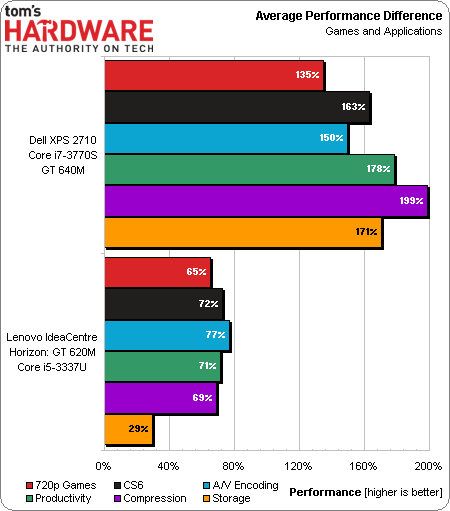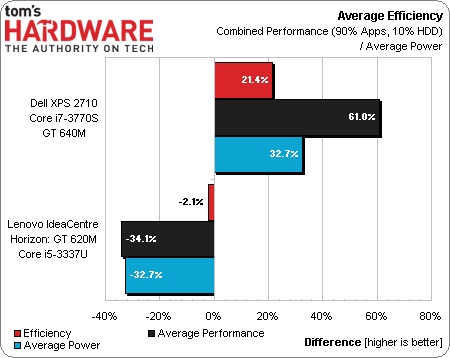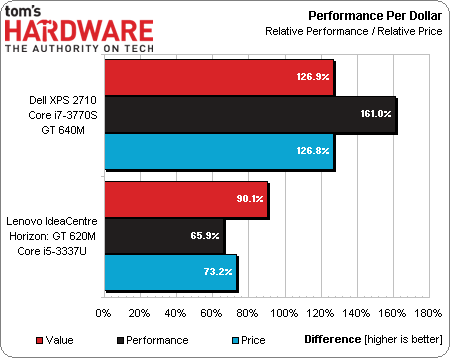Lenovo IdeaCentre Horizon 27 Review: Our First Table PC
The latest all-in-ones look a lot like huge tablets, right? An internal battery adds portability to Lenovo's 27” IdeaCentre Horizon, but is this cool concept still functional as a desktop, or does the push toward mobility sacrifice too much performance?
The Overall Efficiency And Value Of Lenovo's IdeaCentre Horizon
Lenovo’s IdeaCentre Horizon costs far less than Dell’s XPS One 2710, and more affordable parts often translate to better value, even in the face of performance deficits. If that’s the case here, then the IdeaCentre’s portability is going to be icing on the cake.
Using the average of both systems as a baseline (100%), the IdeaCentre performs almost half as well as Dell's pricier XPS One.
All of our comparison charts use a 100% baseline for calculations. Since efficiency can’t exceed 100%, we zero out its chart by subtracting the 100% baseline after making those calculations.
Because its performance trails so far behind, the IdeaCentre Horizon's efficiency is lower, despite using notably less power. Because we're dealing with two large 27" displays, similar energy needs could be hindering Lenovo's efficiency story.
Performance per dollar also suffers. The same exception concerning screen size applies to this measurement as well, but not to the same extent since the lower price you pay for an IdeaCentre Horizon gets you a far lower resolution (1920x1080) than Dell's XPS One (2560x1440). Factoring out the storage tests for those who aren't as worried about boot times narrows the IdeaCentre’s loss by only 5%, and deleting games from the overall results actually increases the XPS One’s victory by 10%.
Paying The Price For Portability
If we ignore differences between screen resolution, Lenovo's slower IdeaCentre Horizon could still use a discount to match the value of Dell's XPS One. If you absolutely need the portability of a battery-equipped touchscreen all-in-one, you're going to have to tolerate the lackluster performance of a 17 W CPU and entry-level graphics processor. But let's say you don't really care about cutting-edge performance. Is there enough cool-factor in a big all-in-one that'll run for almost two hours away from the wall to justify that compromise? I sought out an impression from someone who spends most of her time on tablets.
Get Tom's Hardware's best news and in-depth reviews, straight to your inbox.
Spoiled by Dell's choice of a quicker quad-core processor and accustomed to the lighter software load of her portable devices, the same person who wrote the glowing blurb at the end of my XPS One review, yet wished it could lay completely flat and play the same type of touch-oriented games that the Horizon is designed for, threw her hands up after a few hours and decided that the IdeaCentre's dual-core chip just wasn't fast enough for a desktop PC (even a portable all-in-one). Doh.
Fortunately, the $1500 model we reviewed isn't Lenovo's only offering. The company sells three other designs with Core i7s that are still dual-core, Hyper-Threading-equipped, 17 W chips, but run at higher frequencies. There's even a version with an SSD cache. Just bear in mind that two of the four configurations don't come with batteries. Portability has its price, after all.
Current page: The Overall Efficiency And Value Of Lenovo's IdeaCentre Horizon
Prev Page Energy, Heat, And Battery Life-
sgadadish My only question is why not Haswell?? with all it's benefits for mobility where are the portable with the processor...Reply -
stupiduser As reported on Slashdot IT - "defence agencies of key Western governments such as Australia, the US, Britain, Canada and New Zealand have banned Lenovo gear from being used in sensitive areas, because of concerns that the Chinese vendor has been leaving back doors in its devices for the Chinese Government."Reply
I wish Tom's would aim their incredible testing abilities at these types of claims. I would like to know if MY Lenova is making me vulnerable. -
Crashman Reply
You're right, if we treat this as a huge tablet or an IPC, it looks pretty good. Thanks!11250051 said:Try using this for any length of time as a table pc and your neck and back will be in knots. Not enough gpu power to really make it interesting for gamers but i can see this in industrial, medical applications, schools etc. I can see apu's being used in this application at a much lower price point.
-
rcald2000 I'm a help desk technician and I'll tell you one thing that I've learned about mobile graphics cards in all-in-one PCs; they are a very bad idea. Just yesterday I had the pleasure of troubleshooting a 4-5 year old Dell all-in-one, which had a problem with the video going black for thirty seconds at a time. I of course attempted to upgrade the video drivers, and found out that neither Dell nor nVidia had ever updated the drivers. I believe the computer originally shipped with Vista 32 bit but was advertised as being Windows 7 upgradeable. I base this opinion on the reviews that I read about the machine, and also on the fact that it had both a Windows Vista and Windows 7 logo sticker on it. Dell's site didn't have any drivers newer than 2009 and nVidia's own auto video driver detection application couldn't identify the video card. In conclusion, I think using a mobile video card in a like this size is lame. But I do applaud Lenovo for trying out new ideas. I would have more faith in the form factor if a company like Samsung was behind it. Also, I should mention that I'm typing this very review on my Lenovo X230.Reply
Lenovo X230
i7 ivy bridge processor
16 GB RAM
500 GB 7200 rpm drive
HD4000 integrated graphics
* connected to one external Dell UltraSharp U2412M 24" monitor. -
Ed Chombeau Retired; and need big screen to see ; would take it on car travel but airline travel?Reply -
Crashman Reply11250051 said:Try using this for any length of time as a table pc and your neck and back will be in knots. Not enough gpu power to really make it interesting for gamers but i can see this in industrial, medical applications, schools etc. I can see apu's being used in this application at a much lower price point.
It's about as long and wide as an oversized carry-on bag. Which means you may get it past the gate, or not, depending on how strict the airline staff is being at that gate. And you'd want something to protect the screen.11285869 said:Retired; and need big screen to see ; would take it on car travel but airline travel?



